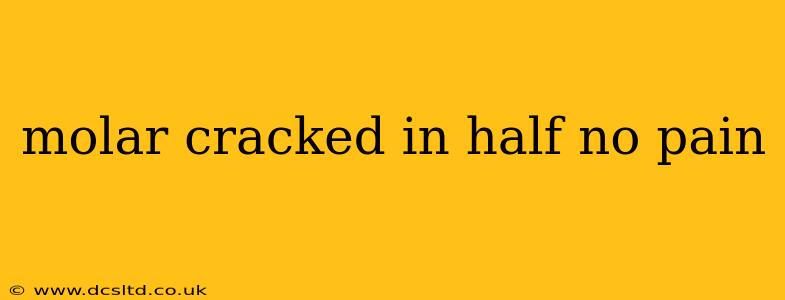Discovering a cracked molar can be alarming, even if it's not causing pain. While the absence of pain might seem reassuring, it's crucial to understand that a cracked molar, even without immediate discomfort, presents a significant dental problem that requires prompt attention. Ignoring it can lead to severe complications down the line. This article will explore the potential causes, implications, and necessary actions when faced with a cracked molar that isn't causing pain.
What Causes a Molar to Crack in Half?
Several factors can contribute to a molar cracking, often without causing immediate pain:
-
Bruxism (Teeth Grinding): This unconscious habit, often occurring during sleep, exerts immense pressure on teeth, leading to fractures over time. The crack may be gradual, developing subtly without noticeable pain until it becomes more significant.
-
Trauma: A blow to the jaw, even a seemingly minor one, can cause hairline fractures or more substantial cracks in a molar. These cracks might not be immediately apparent or painful.
-
Dental Procedures: Occasionally, a pre-existing weakened tooth might crack during dental procedures like fillings or crown placement. The crack may not manifest pain initially.
-
Large Fillings: Extensive fillings can weaken a tooth, making it more susceptible to cracking under normal chewing forces. Over time, the weakened structure can fracture.
-
Underlying Tooth Decay: Extensive decay can significantly weaken the tooth's structure, predisposing it to cracking.
Why Isn't My Cracked Molar Hurting?
The absence of pain with a cracked molar can be attributed to several reasons:
-
The crack hasn't reached the pulp (nerve): The pulp is the inner core of the tooth containing nerves and blood vessels. If the crack doesn't penetrate this area, there's no nerve stimulation, thus no pain.
-
The crack is small and stable: A tiny, stable crack might not cause pain unless it undergoes further stress or movement.
-
Delayed nerve response: Sometimes, the nerve may react later, with pain developing only after the crack worsens or becomes infected.
What Happens If I Ignore a Cracked Molar?
Ignoring a cracked molar, even without pain, can lead to serious consequences:
-
Pulp infection: Bacteria can enter the crack, infecting the pulp and causing severe pain, an abscess (a pocket of pus), and potentially spreading the infection to surrounding tissues.
-
Tooth loss: The crack may worsen, eventually causing the tooth to break completely and require extraction.
-
Increased risk of further cracking: The weakened tooth structure is more susceptible to additional cracks and fractures.
How Is a Cracked Molar Diagnosed?
Your dentist will utilize several methods to diagnose a cracked molar:
-
Visual examination: A thorough examination to check for any visible cracks or abnormalities.
-
Bite test: Applying pressure to different parts of the tooth to identify pain or sensitivity.
-
Radiographs (X-rays): X-rays can often reveal cracks not visible during a visual examination.
-
Transillumination: Shining a light through the tooth to identify any irregularities in its structure.
How Is a Cracked Molar Treated?
Treatment options depend on the severity and location of the crack:
-
Dental bonding: For minor cracks, this involves applying a resin material to strengthen the tooth.
-
Crown placement: A crown covers the entire tooth, protecting it from further damage and restoring its strength.
-
Root canal: If the crack has reached the pulp, a root canal is needed to remove the infected pulp and prevent further infection.
-
Extraction: In cases of severe damage or when other treatments are unsuccessful, extraction might be necessary.
Can a Cracked Molar Be Saved?
In many cases, yes, a cracked molar can be saved with prompt treatment. The success of treatment heavily depends on the extent of the crack, the presence of infection, and how quickly you seek professional dental care.
What Should I Do If I Suspect I Have a Cracked Molar?
Schedule an appointment with your dentist immediately. Early diagnosis and intervention greatly improve the chances of successful treatment and preserving your tooth. Delaying treatment can significantly worsen the problem and lead to more complex and costly solutions.
Disclaimer: This information is intended for educational purposes only and should not be considered medical advice. Always consult with a qualified dental professional for diagnosis and treatment.
